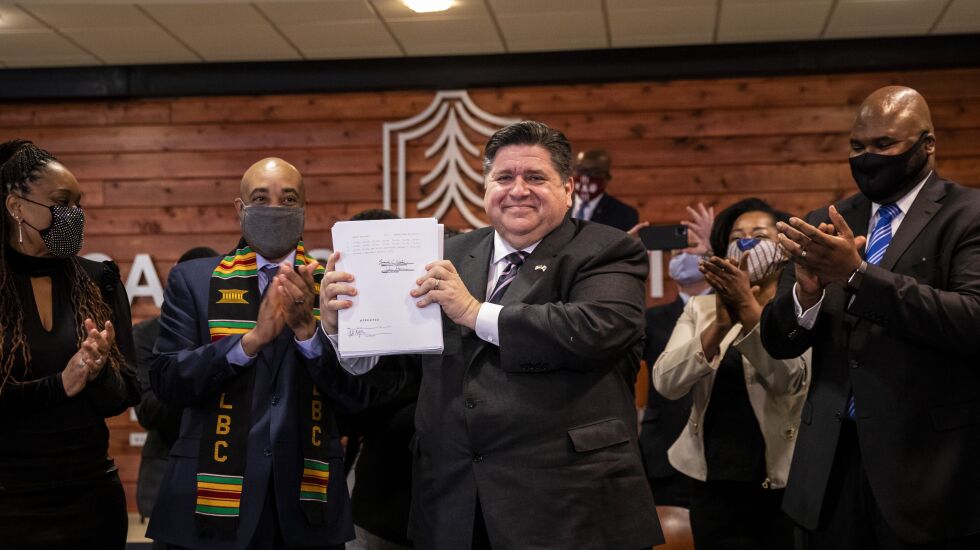
Illinois’ massive criminal justice reform law survived blistering political attacks throughout the 2022 election campaign and a renewed spotlight when lawmakers returned to Springfield a few weeks ago.
Now, the controversial SAFE-T Act faces a new test in court, where opponents argue the General Assembly “doubled down” on violations to the state constitution when they amended it earlier this month.
Kankakee County Circuit Court Judge Thomas W. Cunnington is set to hear oral arguments Dec. 20 over claims brought in roughly 60 lawsuits, now combined, from prosecutors and sheriffs around the state.
He will do so less than two weeks before the centerpiece of the law — the elimination of cash bail — is set to go into effect Jan. 1. Judges are expected to then decide whether defendants charged after the start of the year will be locked up while awaiting trial based on their alleged crime and whether they pose a threat or are likely to flee.
Supporters say the law is intended to address long-standing public safety issues, police distrust and a system that lets wealthy defendants buy their way out of jail. Though recent amendments were unlikely to seriously affect the litigation, a new brief and amended complaint filed Friday confirm that opponents still view the law as “replete with so many fundamental constitutional violations that it cannot be remedied.”
The case before Cunnington will likely be the first of many legal challenges to the SAFE-T Act. The lawsuit raises some of the same questions that led lawmakers to pass clarifying changes on Dec. 1. But at its core, the lawsuit revolves around whether the law aligns with Illinois’ constitution, both in its content and in its passage.
The lawsuit alleges the SAFE-T Act violates the separation of powers and improperly addresses multiple subjects. It claims lawmakers who passed the law violated a rule that requires them to read bills “on three different days” in each legislative chamber. It even alleges the SAFE-T Act improperly amended the state constitution.
But perhaps the most interesting question raised by the lawsuit revolves around part of the constitution that says “all persons shall be bailable by sufficient sureties,” with a few exceptions.
One exception is when defendants are facing life in prison. Another is when they are charged with certain felonies and a judge has determined they pose a “real and present threat to the physical safety of any person.”
Lawyers for the sheriffs and prosecutors have insisted in their briefs that, “The Illinois Constitution interprets bail, at its core, to include a monetary amount that, though it may take different forms, cannot be abolished altogether without running afoul of the Constitution.”
State lawyers say their opponents have misread the document. Lawmakers sought to clarify things earlier this month, changing the law to note that the “sureties” at issue are meant to be “nonmonetary in nature.”
Still, that doesn’t change the meaning “in the Constitution itself,” the opponents noted in their new brief.
SAFE-T Act supporters have pointed out that, under the current system, people are often let out of jail on their own recognizance, without posting bond. Opponents call that a “red herring,” insisting that judges “cannot be deprived of the ability to impose monetary bail.”
“In removing the ability to require monetary bail, the legislature has stripped the judiciary of an essential tool guaranteed under the Constitution without taking the issue to the voters as is required,” their lawyers wrote in the brief.
Ann Lousin, a professor of law at University of Illinois Chicago Law School who lectures and consults on the Illinois constitution, agreed in recent conversations with the Chicago Sun-Times that there are other ways to define “sufficient sureties.”
“It doesn’t have to be money,” said Lousin, who also worked on the drafting of the 1970 state constitution.
She said the other argument, that judges can’t be deprived of the ability to impose monetary bail “does not ring true.”
But that raises the question of what can be imposed. David Olson, co-director of the Loyola Center for Criminal Justice, is involved in a four-year study of the SAFE-T Act’s pretrial reforms. He recently said the most frequent, middle-of-the-spectrum example of a nonmonetary “surety” would be pretrial supervision.
Defendants placed on pretrial supervision could be required to check in with court personnel or subject themselves to drug testing. That system could also offer support to defendants, reminding them about their court dates and checking to see if they need transportation or child care.
“The challenge right now is, in many of Illinois’ counties, they do not have any capacity to provide any kind of pretrial supervision,” Olson said.
That’s why he said the Office of Statewide Pretrial Services has been established through the Illinois Supreme Court, to offer that service in parts of the state where it’s not available.
The most restrictive example of a “surety” would be electronic monitoring, Olson said. Whether a defendant’s simple promise to return to court would count at the other end of the spectrum, he said, could depend on a judge viewing it “as something of value.”
Olson also said that failures to appear in court could be held against a defendant at sentencing if that person is convicted.
“There ultimately could be a price paid when you fail to appear a lot,” Olson said.
Whether these questions are even hashed out before Cunnington remains to be seen. State lawyers argue the judge shouldn’t consider the sureties question on its merits. They argue that the constitution’s “sufficient sureties” requirement is a right bestowed on criminal defendants — meaning prosecutors and sheriffs can’t claim it as a violated right of their own.
That raises even more questions about who could claim that right, and sue, once the use of cash bail ends Jan. 1, though.
“Trying to find the ideal plaintiff is going to be tough,” Lousin said. “That has to be somebody whom this affects personally and very concretely.”
Contributing: Tina Sfondeles and Matthew Hendrickson







